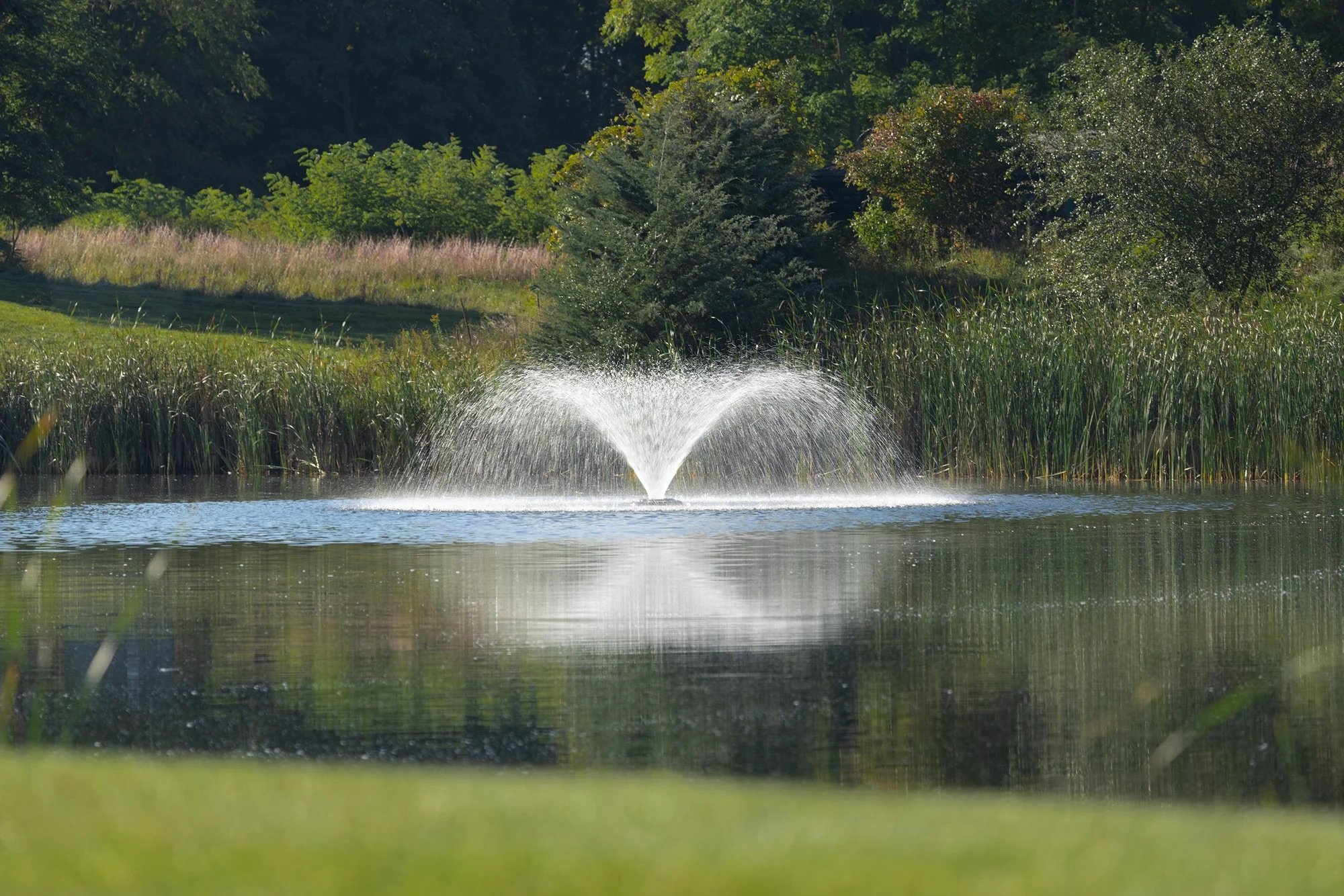
Ponds bring beauty and balance to communities, golf courses, and private properties, but they can also attract unwanted wildlife. Canada geese, ducks, muskrats, raccoons, and even invasive zebra or quagga mussels can cause water quality issues, shoreline damage, and costly maintenance problems. Keeping your pond healthy and wildlife under control requires a proactive, year-round plan that combines prevention, habitat management, and professional pond services.
Common Wildlife Concerns
Too much wildlife activity can quickly turn a healthy pond into a problem area:
- Water quality decline: Goose and duck droppings release phosphorus, which promotes algae growth and cloudy water.
- Shoreline erosion: While muskrats and beavers play important ecological roles in natural wetlands and streams, their activity in ponds can cause serious damage. Burrowing and chewing can erode banks, weaken embankments, and harm docks, pipes, and equipment like aerators and fountains.
- Vegetation loss: Grazing from waterfowl reduces native plant buffers, which protect against erosion and nutrient runoff.
- Fish depletion: Cormorants and herons can consume significant fish stocks, impacting recreational ponds.
- Infrastructure damage: Zebra and quagga mussels attach to aerators, fountains, and pipes, causing clogs and expensive repairs.
- Safety risks: Raccoons and aggressive geese can pose hazards to residents, pets, and children.
Recognizing these risks helps property owners and managers plan ahead before problems escalate.
Prevention Comes First
The most effective wildlife management begins with prevention:
- Plant native vegetation along the shoreline to discourage geese and ducks from landing and nesting.
- Add shoreline barriers like rip rap or low fencing to block muskrats and reduce erosion.
- Watch for invasive mussels: Early detection of zebra or quagga mussels makes control more manageable.
- Remove attractants: Avoid feeding wildlife, and secure trash bins to limit scavengers.
- Use deterrent devices: Motion-activated sprinklers, lights, or sound systems can safely discourage nuisance animals.
Smart Habitat Management
A balanced pond ecosystem naturally limits nuisance wildlife:
- Aeration and circulation systems reduce stagnant water and algae buildup, making the pond less appealing to waterfowl.
- Healthy fish populations help maintain ecological balance and support a thriving pond community.
- Native vegetation buffers filter runoff, protect shorelines, and provide habitat for burrowing or nesting animals.
Seasonal Pond Protection
Wildlife management isn’t a one-time effort. It’s an ongoing process that changes with the seasons:
- Spring/Summer: Focus on vegetation management, goose deterrents, and invasive mussel monitoring.
- Fall: Clean up organic debris and prepare for migratory waterfowl.
- Winter: Check shoreline stability, maintain aeration, and prevent ice buildup that could shelter wildlife.
Professional Pond Management Support
Water & Wetland LLC provides customized wildlife control and pond management services to help property owners maintain safe, healthy, and attractive ponds. Our team specializes in:
- Habitat assessments and shoreline restoration
- Aeration and fountain system maintenance
- Vegetation control and erosion prevention
- Seasonal monitoring for invasive species and water quality
With professional guidance, your pond can remain balanced, beautiful, and free from damage caused by nuisance wildlife.
Takeaway:
Nuisance wildlife can threaten pond health, water quality, and infrastructure. A proactive, year-round plan, backed by Water & Wetland, keeps your pond clear, balanced, and protected.
About Water & Wetland, A Jones Lake Management Partner
Water & Wetland is a trusted expert in lake, pond, and wetland management, providing innovative and environmentally responsible solutions to control invasive species, restore shorelines, and improve water quality. As a Jones Lake Management Partner, we serve HOAs, golf courses, municipalities, and private landowners with customized lake and pond management plans designed to promote long-term ecological health. We understand the importance of proper permitting and regulatory compliance, ensuring that all projects meet local, state, and federal environmental standards. With a commitment to sustainability and science-based practices, Water & Wetland helps clients maintain thriving, well-balanced waterbodies.
